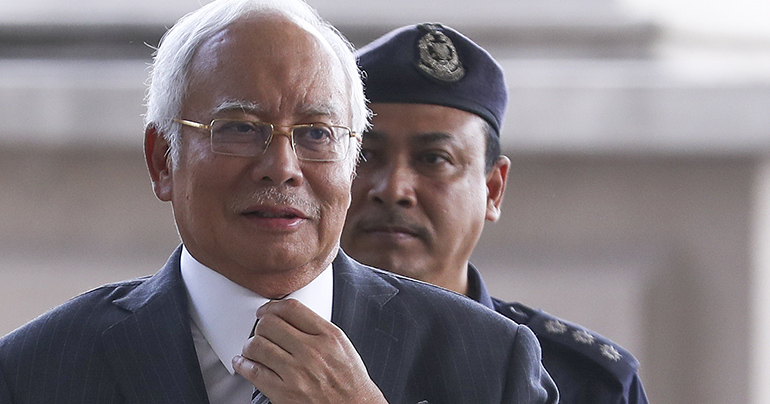With Malaysia’s disgraced former prime minister Najib Razak’s trial delayed, Southeast Asia Globe speaks with former Malaysian Institute of Integrity principal fellow Abdul Rahman Embong about what role this high-profile prosecution plays in the new government’s crackdown on corruption

The news that former Malaysian prime minister Najib Razak’s trial for his alleged involvement in the multi-billion dollar 1MDB scandal has been postponed will see justice delayed for the millions of Malaysians who voted to depose a politician accused of pocketing billions of dollars from the nation’s sovereign wealth fund.
The trial, which was set to begin today, will see the embattled Najib facing seven charges related to the theft of more than $10m from the sovereign wealth fund. A total of 42 charges of corruption, money laundering and abuse of power have been brought against the former prime minister after the Pakatan Harapan (PH) coalition swept into power last year under the leadership of Najib’s former mentor Mahathir Mohamad.
Southeast Asia Globe speaks with Abdul Rahman Embong, emeritus professor at Universiti Kebangsaan Malaysia’s Institute of Malaysian and International Studies and former principal fellow at the Malaysian Institute of Integrity, about just what Najib Razak’s trial means for the wider fight against corruption under the new government.
When we spoke in June last year, you said that “the formula for a successful war against corruption is a combination of factors: strong and sustained political will at the top, followed by effective relevant state institutions swinging into action without fear or favour, strong support by the people, as well as media and civil society”. To what extent has PH demonstrated this sustained political will, and how effective have state institutions been at carrying out the kind of sweeping reforms supported by the public?
My observation is that since taking over power last May, PH has demonstrated a sustained political will to crack down on corruption, especially mega corruption centering around 1MDB. MACC (Malaysian Anti-Corruption Commission) has swung into action aggressively, while the AG’s Chambers under the new attorney general Tommy Thomas has got down to meticulous work and charged the former prime minister Najib Razak, and a number of others connected with him. The court is now busy, and this week’s trial – which Najib’s defence team has tried hard to delay – has attracted not only Malaysian but the world media to Kuala Lumpur.
[manual_related_posts]
What role do you believe Najib Razak’s trial will have in building and maintaining public pressure on the new government to fulfil its anti-corruption promises beyond the 1MDB scandal?
[Najib’s] trial is a very important milestone in rebuilding the country’s institutions and especially in reclaiming the independence and integrity of the judiciary, upholding the rule of law, and pushing further the anti-corruption agenda. The trial will surely add pressure that is mounting among the public for Malaysia to really strive to be corruption-free and move beyond the 1MDB scandal. Now that the PH government has launched the new National Anti-Corruption Plan (NACP) last month, the stakes are much higher, as the public will measure up the PH government against the objectives, policies, strategies and outcomes outlined in the NACP. At least there is now a roadmap beyond the PH manifesto to wage the war against corruption, but the apparatus to fight corruption must be strengthened in terms of human and material resources. The PH government cannot be contented by plucking low-hanging fruits; it must strike at mega corruption head on and win big. That is the expectation.
Are you concerned that the focus on Najib Razak and his role in the 1MDB scandal could distract attention away from the broader push against institutional corruption in Malaysia?
There are two issues here. The 1MDB scandal is the worst in the country’s history, and perhaps one of the biggest in the world, with its webs of deception beyond the laypersons’ comprehension and imagination. In this respect, Malaysia is on the world map for the wrong reason. And a lot of focus and energy has to be given to address this issue to its conclusions.
But, I see a silver lining here. This scandal provides an opportunity to undertake the much-needed institutional reforms and root out institutional corruption. It is far-sighted for the PH government to set up the Council of Eminent Persons (CEP), which in turn formed the Institutional Reforms Committee (IRC). The work and recommendations of this IRC will, I hope, contribute positively towards this much-needed change. This change may take a decade or two to have effect, but a good start is being made. Tackling the scourge of 1MDB thus cannot be a distraction, but a historic lesson learnt for future generations as long as the focus on 1MDB and Najib is placed within this larger agenda of rooting out systemic institutional corruption in the long term.

